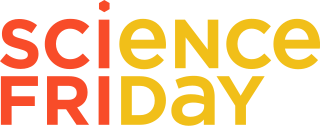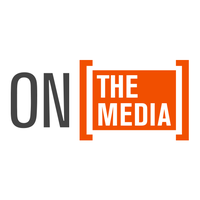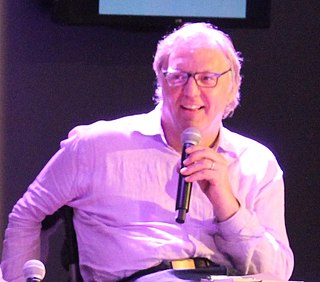
Science Friday is a weekly call-in talk show that broadcasts each Friday on public radio stations, distributed by WNYC Studios, and carried on over 470 public radio stations. SciFri is hosted by science journalist Ira Flatow and was created and is produced by the Science Friday Initiative. The program is divided into two one-hour programs, with each hour ending with a complete sign-off. The focus of each program is news and information on science, nature, medicine, and technology. The show originated as the Friday episode of the daily call-in talk show Talk of the Nation, but was spun off as a series in its own right when Talk of the Nation was canceled in June 2013.

Public Radio International (PRI) was an American public radio organization. Headquartered in Minneapolis, Minnesota, PRI provided programming to over 850 public radio stations in the United States.

WNYC is the trademark and a set of call letters shared by WNYC (AM) and WNYC-FM, a pair of nonprofit, noncommercial, public radio stations located in New York City. WNYC is owned by New York Public Radio (NYPR), a nonprofit organization that did business as "WNYC RADIO" until March 2013.

WBEZ – branded WBEZ 91.5 – is a non-commercial educational radio station licensed to Chicago, Illinois, and primarily serving the Chicago metropolitan area. It is owned by Chicago Public Media and is financed by listener contributions, corporate underwriting and some government funding. WBEZ is affiliated with both National Public Radio (NPR) and the Public Radio Exchange (PRX). It also broadcasts content from American Public Media and the BBC World Service. It produces several nationally syndicated shows for public radio stations, including This American Life and has a co-production credit for Wait Wait... Don't Tell Me!, which is produced by NPR.

On the Media (OTM) is an hour-long weekly radio program hosted by Brooke Gladstone, covering journalism, technology, and First Amendment issues. It is produced by WNYC in New York City. OTM is first broadcast on Friday evening over WNYC's FM service and is syndicated nationwide to more than 400 other public radio outlets. The program is available by audio stream, MP3 download, and podcast. OTM also publishes a weekly newsletter featuring news on current and past projects as well as relevant links from around the web.

John Charles Hockenberry is an American journalist and author. He has reported from all over the world, on a wide variety of stories in several mediums for more than three decades. He has written dozens of magazine and newspaper articles, a play, and two books, including the bestselling memoir Moving Violations: War Zones, Wheelchairs, and Declarations of Independence, which was a finalist for the National Book Critics Circle Award, and the novel A River Out Of Eden. He has written for The New York Times, The New Yorker, Wired, The Columbia Journalism Review, Metropolis, The Washington Post, and Harper's Magazine.
Adaora Udoji is an American journalist and producer. She has worked in virtual reality (VR), augmented reality (AR), and artificial intelligence (AI). She is an adviser to VR-AR Association-NYC Chapter, an adjunct professor at NYU's Interactive Telecommunications Program at the Tisch School of the Arts, and an occasional investor.
Studio 360 was an American weekly public radio program about the arts and culture hosted by novelist Kurt Andersen and produced by Public Radio Exchange (PRX) and Slate in New York City. The program's stated goal was to "Get inside the creative mind" and used arts and culture as a lens to understand the world. The program was created by PRI based on an identified need for programming dedicated and focused on arts and culture journalism in media. While the show featured regular guest interviews with authors such as Joyce Carol Oates, Jonathan Lethem, and Miranda July, and musicians as diverse as Laura Veirs, Don Byron, and k.d. lang, it also had several recurring segments. The American Icons series attempted to understand lasting American cultural icons such as The Great Gatsby and Kind of Blue. The hour on Moby-Dick was the recipient of the 2004 Peabody Award. Public Radio International and WNYC co-produced the show from 2000 to 2017, when Slate replaced WNYC. After PRI merged with PRX, PRX continued to syndicate the show until the program's cancellation. The program was funded in part by the National Endowment for the Humanities

Leonard Lopate is an American radio personality. He is the host of the radio talk show Leonard Lopate at Large, broadcast on WBAI, and the former host of the public radio talk show The Leonard Lopate Show, broadcast on WNYC. He first broadcast on WKCR, the college radio station of Columbia University, and then later on WBAI, before moving to WNYC.

KUNV is a non-commercial, jazz-oriented campus radio station in Paradise, Nevada, broadcasting from Greenspun Hall on the campus of University of Nevada, Las Vegas (UNLV).

New York Public Radio (NYPR) is the owner of WNYC (AM), WNYC-FM, WNYC Studios, WQXR-FM, New Jersey Public Radio, Gothamist, and the Jerome L. Greene Performance Space. Combined, New York Public Radio owns WNYC (AM), WNYC-FM, WQXR-FM, WQXW, WNJT-FM, WNJP, WNJY, and WNJO.

Melissa Victoria Harris-Perry, formerly known as Melissa Victoria Harris-Lacewell, is an American writer, professor, television host, and political commentator with a focus on African-American politics. Harris-Perry hosted the Melissa Harris-Perry weekend news and opinion television show on MSNBC from 2012 to February 27, 2016.

Radiolab is a radio program produced by WNYC, a public radio station based in New York City, and broadcast on public radio stations in the United States. The show is nationally syndicated and is available as a podcast. Live shows were first offered in 2008.

WNYC-FM (93.9 MHz) is a non-profit, non-commercial, public radio station licensed to New York City. It is owned by New York Public Radio along with WNYC (AM), Newark, New Jersey-licensed classical music outlet WQXR-FM (105.9 MHz), New Jersey Public Radio, and the Jerome L. Greene Performance Space. New York Public Radio is a not-for-profit corporation, incorporated in 1979, and is publicly supported through membership, development and sponsorship. The station broadcasts from studios and offices located in the Hudson Square neighborhood in lower Manhattan. WNYC-FM's transmitter is located at the Empire State Building. The station serves the New York metropolitan area.

John Schaefer is an American radio host and author. A longtime host at WNYC, Schaefer began hosting the influential radio shows New Sounds in 1982 and Soundcheck in 2002, and has produced many different programs for other New York Public Radio platforms. Schaefer is also the author of the book New Sounds: A Listener's Guide to New Music, first published in 1987.

National Public Radio is an American non-profit media organization headquartered in Washington, D.C., with its NPR West headquarters in Culver City, California. It serves as a national syndicator to a network of over 1,000 public radio stations in the United States. It differs from other non-profit membership media organizations such as the Associated Press, in that it was established by an act of Congress.

Celeste Headlee is an American radio journalist, author, public speaker, and co-host of the weekly series Retro Report on PBS. In her 20-year career in public radio, Headlee has served as the host of the Georgia Public Broadcasting program "On Second Thought" and co-host of the national morning news show The Takeaway. Before 2009, she was the Midwest Correspondent for NPR's Day to Day and the host of a weekly show on Detroit Public Radio. Headlee is the author of We Need to Talk: How to Have Conversations That Matter.

Laura Ruth Walker is an American executive and current President of Bennington College. From 1995 to 2019, Walker was President and CEO of New York Public Radio (NYPR), a nonprofit media organization that operates WNYC, WNYC Studios, classical WQXR-FM, the website Gothamist, New Jersey Public Radio, and The Jerome L. Greene Performance Space. The organization produces programs for local and national audiences, including The Brian Lehrer Show, Radiolab, More Perfect, On The Media, Nancy, The New Yorker Radio Hour, Trump, Inc., Death, Sex & Money, Snap Judgment, Here’s the Thing with Alec Baldwin, All Of It, The Takeaway, Caught, The United States of Anxiety, Aria Code, Carnegie Hall Live, and 2 Dope Queens, reaching an average audience of 23.4 million people each month. New York Public Radio received ten George Foster Peabody Awards and five Alfred I. duPont awards during her tenure.
WNYC Studios is a producer and distributor of podcasts and on-demand and broadcast audio. WNYC Studios is a subsidiary of New York Public Radio and is headquartered in New York City.
Tanzina Vega is an American journalist. After reporting for the New York Times and CNN, she served as the weekday host of The Takeaway, a public radio show broadcast, until July 2021.















